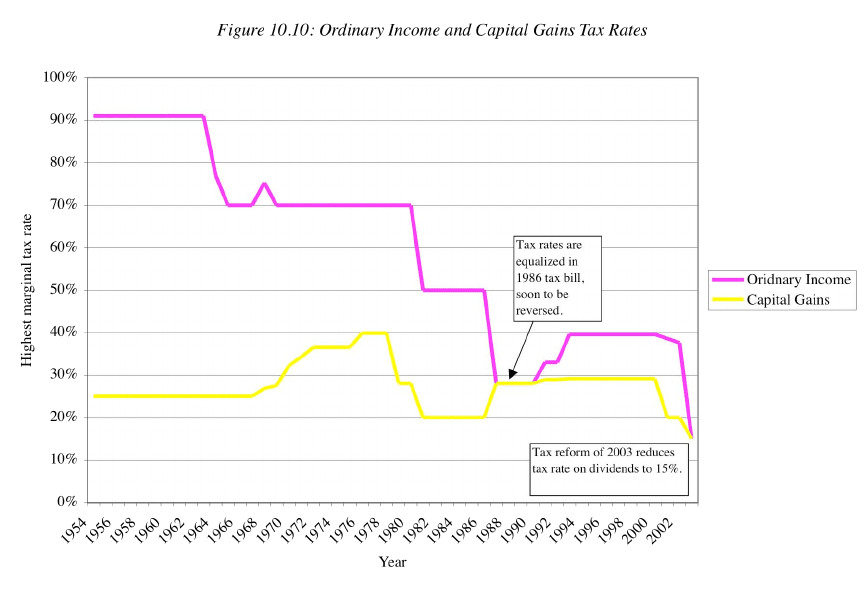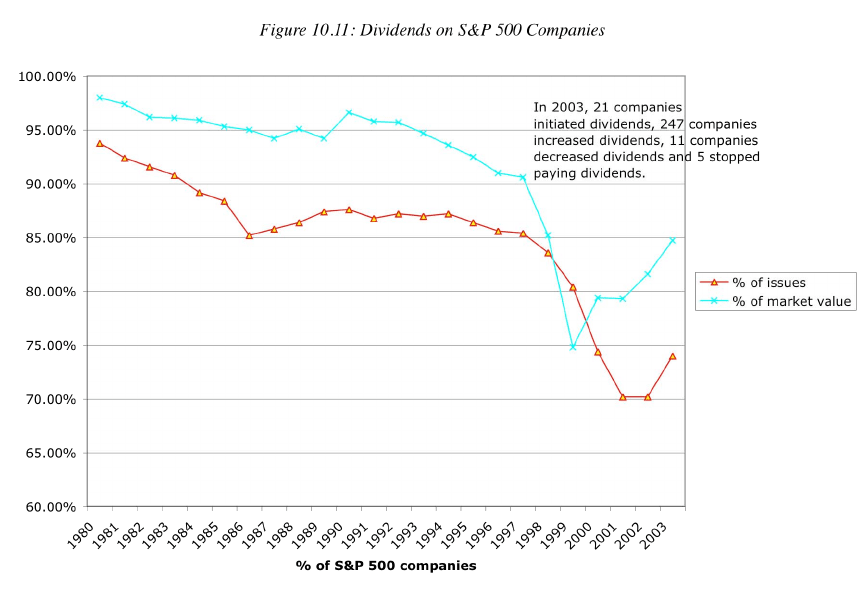Damodaran A. Applied corporate finance
Подождите немного. Документ загружается.

19
19
cash flows from dividends. When it pays out more, the price decreases but is exactly
offset by the increase in dividends per share.
Note, though, that the value per share remains unchanged because we assume that
there are no tax differences to investors between dividends and capital gains, that firms
can raise new capital with no issuance costs, and that firms do not change their
investment policy. These assumptions eliminate the costs associated with paying either
more in dividends or less.
Implications of Dividend Irrelevance
If dividends are, in fact, irrelevant, firms are spending a great deal of time
pondering an issue about which their stockholders are indifferent. A number of strong
implications emerge from this proposition. Among them, the value of equity in a firm
should not change as its dividend policy changes. This does not imply that the price per
share will be unaffected, however, since larger dividends should result in lower stock
prices and more shares outstanding. In addition, in the long term, there should be no
correlation between dividend policy and stock returns. Later in this chapter, we will
examine some studies that have attempted to examine whether dividend policy is in fact
irrelevant in practice.
The assumptions needed to arrive at the dividend irrelevance proposition may
seem so onerous that many reject it without testing it. That would be a mistake, however,
because the argument does contain a valuable message: Namely, a firm that has invested
in bad projects cannot hope to resurrect its image with stockholders by offering them
higher dividends. In fact, the correlation between dividend policy and total stock returns
is weak, as we will see later in this chapter.
The “Dividends Are Bad” School
In the United States, dividends have historically been taxed at much higher rates
than capital gains. Based upon this tax disadvantage, the second school of thought on
dividends argued that dividend payments reduce the returns to stockholders after personal
taxes. Stockholders, they posited, would respond by reducing the stock prices of the firms
making these payments, relative to firms that do not pay dividends. Consequently, firms
would be better off either retaining the money they would have paid out as dividends or

20
20
repurchasing stock. In 2003, the basis for this argument was largely eliminated when the
tax rate on dividends was reduced to match the tax rate on capital gains. In this section,
we will consider both the history of tax-disadvantaged dividends and the potential effects
of the tax law changes.
6
The History of Dividend Taxation
The tax treatment of dividends varies widely depending upon who receives the
dividend. Individual investors are taxed at ordinary tax rates, corporations are sheltered
from paying taxes on at least a portion of the dividends they receive and pension funds
are not taxed at all.
Individuals
Since the inception of income taxes in the early part of the twentieth century in
the United States, dividends received on investments have been treated as ordinary
income, when received by individuals, and taxed at ordinary tax rates. In contrast, the
price appreciation on an investment has been treated as capital gains and taxed at a
different and much lower rate. Figure 10.10 graphs the highest marginal tax rate on
dividends in the United States and the highest marginal capital gains tax rate since 1954
(when capital gains taxes were introduced).
6
Adding to the uncertainty is the fact that the tax changes of 2003 are not permanent and are designed to
sunset (disappear) in 2010. It is unclear whether the tax disadvantages of dividends have disappeared for
the long term or only until 2010.

21
21
Barring a brief period after the 1986 tax reform act, when dividends and capital gains
were both taxed at 28%, the capital gains tax rate has been significantly lower than the
ordinary tax rate in the United States. In 2003, the tax rate on dividends was dropped to
15% to match the tax rate on capital gains, thus nullifying the tax disadvantage of
dividends.
There are two points worth making about this chart. The first is that these are the
highest marginal tax rates and that most individuals are taxed at lower rates. In fact, some
older and poorer investors may pay no taxes on income, if their income falls below the
threshold for taxes. The second and related issue is that the capital gains taxes can be
higher for some of these individuals than the ordinary tax rate they pay on dividends.
Overall, though, wealthier individuals have more invested in stocks than poorer
individuals, and it seems fair to conclude that individuals have collectively paid
significant taxes on the income that they have received in dividends over the last few
decades.

22
22
Institutional Investors
About two-thirds of all traded equities are held by institutional investors rather
than individuals. These institutions include mutual funds, pension funds and corporations
and dividends get taxed differently in the hands of each.
• Pension funds are tax-exempt. They are allowed to accumulate both dividends and
capital gains without having to pay taxes. There are two reasons for this tax
treatment. One is to encourage individuals to save for their retirement and to
reward savings (as opposed to consumption). The other reason for this is that
individuals will be taxed on the income they receive from their pension plans and
that taxing pension plans would in effect tax the same income twice.
• Mutual funds are not directly taxed, but investors in mutual funds are taxed for
their share of the dividends and capital gains generated by the funds. If high tax
rate individuals invest in a mutual fund that invests in stocks that pay high
dividends, these high dividends will be allocated to the individuals based on their
holdings and taxed at their individual tax rates.
• Corporations are given special protection from taxation on dividends they receive
on their holdings in other companies, with 70% of the dividends exempt from
taxes
7
. In other words, a corporation with a 40% tax rate that receives $ 100
million in dividends will pay only $12 million in taxes. Here again, the reasoning
is that dividends paid by these corporations to their stockholders will ultimately
be taxed.
Tax Treatment of Dividends in other markets
Many countries have plans in place to protect investors from the double taxation
of divided. There are two ways in which they can do this. One is to allow corporations to
claim a full or partial tax deduction for dividends paid. The other is to give partial or full
tax relief to individuals who receive dividends.
7
The exemption increases as the proportion of the stock held increases. Thus, a corporation that owns 10%
of another company’s stock has 70% of dividends exempted. This rises to 80% if the company owns
between 20 and 80% of the stock and to 100% if the company holds more than 80% of the outstanding
stock.
23
23
Corporate Tax Relief
In some countries, corporations are allowed to claim a partial or full deduction for
dividends paid. This brings their treatment into parity with the treatment of the interest
paid on debt, which is entitled to a full deduction in most countries. Among the OECD
countries, the Czech Republic and Iceland offer partial deductions for dividend payments
made by companies but no country allows a full deduction. In a variation, Germany, until
recently, applied a higher tax rate to income that was retained by firms than to income
that was paid out in dividends. In effect, this gives a partial tax deduction to dividends.
Why don’t more countries offer tax relief to corporations? There may be two
factors. One is the presence of foreign investors in the stock who now also share in the
tax windfall. The other is that investors in the stock may be tax exempt or pay no taxes,
which effectively reduces the overall taxes paid on dividends to the treasury to zero.
Individual Tax Relief
There are far more countries that offer tax relief to individuals than to
corporations. This tax relief can take several forms:
• Tax Credit for taxes paid by corporation: Individuals can be allowed to claim the
taxes paid by the corporation as a tax credit when computing their own taxes. In
the example earlier in the paper, where a company paid 30% of its income of $
100 million as taxes and then paid its entire income as dividends to individuals
with 40% tax rates the individuals would be allowed to claim a tax credit of $ 30
million against the taxes owed, thus reducing taxes paid to $ 10 million. In effect,
this will mean that only individuals with marginal tax rates that exceed the
corporate tax rate will be taxed on dividends. Australia, Finland, Mexico,
Australia and New Zealand allow individuals to get a full credit for corporate
taxes paid. Canada, France, the U.K and Turkey allow for partial tax credits.
• Lower Tax Rate on dividends: Dividends get taxed at a lower rate than other
income to reflect the fact that it is paid out of after-tax income. In some countries,
the tax rate on dividends is set equal to the capital gains tax rate. Korea, for
instance, has a flat tax rate of 16.5% for dividend income.
24
24
In summary, it is far more common for countries to provide tax relief to investors
than to corporations. Part of the reason for this is political. By focusing on individuals,
you can direct the tax relief only towards domestic investors and only to those investors
who pay taxes in the first place.
Timing of Tax Payments
When the 1986 tax law was signed into law, equalizing tax rates on ordinary
income and capital gains, some believed that all the tax disadvantages of dividends had
disappeared. Others noted that, even with the same tax rates, dividends carried a tax
disadvantage because the investor had no choice as to when to report the dividend as
income; taxes were due when the firm paid out the dividends. In contrast, investors
retained discretionary power over when to recognize and pay taxes on capital gains, since
such taxes were not due until the stock was sold. This timing option allowed the investor
to reduce the tax liability in one of two ways. First, by taking capital gains in periods of
low income or capital losses to offset against the gain, the investor could now reduce the
taxes paid. Second, deferring a stock sale until an investor’s death could result in tax
savings. Since the tax rates on capital gains have decreased relative to the tax rates on
dividends since, this timing option should make capital gains an even more attractive
option now.
Assessing Investor tax preferences for dividends
As you can see from the discussion above, the tax rate on dividends can vary
widely for different investors – individual, pension fund, mutual fund or corporation –
receiving the dividends and even for the same investor on different investments. It is
difficult therefore to look at a company’s investor base and determine their preferences
for dividends and capital gains. A simple way to measure the tax disadvantage associated
with dividends is to measure the price change on the ex-dividend date and compare it to
the actual dividend paid. The stock price on the ex-dividend day should drop to reflect the
loss in dividends to those buying the stock after that day. It is not clear, however, whether
the price drop will be equal to the dividends if dividends and capital gains are taxed at
different rates.

25
25
To see the relationship between the price drop and the tax rates of the marginal
investor, assume that investors in a firm acquired stock at some point in time at a price P,
and that they are approaching an ex-dividend day, in which the dividend is known to be
D. Assume that each investor in this firm can either sell the stock before the ex-dividend
day at a price P
B
or wait and sell it after the stock goes ex-dividend at a price P
A
. Finally,
assume that the tax rate on dividends is t
o
and that the tax rate on capital gains is t
cg
. The
cash flows the investor will receive from selling before the stock goes ex-dividend is –
CF
B
= P
B
- (P
B
- P) t
cg
In this case, by selling before the ex-dividend day, the investor receives no dividend. If
the sale occurs after the ex-dividend day, the cash flow is –
CF
A
= P
A
- (P
A
- P) t
cg
+ D (1-t
o
)
If the cash flow from selling before the ex-dividend day were greater than the cash flow
from selling after, the investors would all sell before, resulting in a drop in the stock
price. Similarly, if the cash flows from selling after the ex-dividend day were greater than
the cash flows from selling before, every one would sell after, resulting in a price drop
after the ex-dividend day. To prevent either scenario, the marginal investors in the stock
have to be indifferent between selling before and after the ex-dividend day. This will
occur only if the cash flows from selling before are equal to the cash flows from selling
after:
P
B
- (P
B
- P) t
cg
= P
A
- (P
A
- P) t
cg
+ D (1-t
o
)
This can be simplified to yield the following ex-dividend day equality:
P
B
! P
A
D
=
(1- t
o
)
(1 ! t
cg
)
Thus, a necessary condition for the marginal investor to be indifferent between selling
before and after the ex-dividend day is that the price drop on the ex-dividend day must
reflect the investor’s tax differential between dividends and capital gains.
Turning this equation around, we would argue that by observing a firm’s stock
price behavior on the ex-dividend day and relating it to the dividends paid by the firm, we
can, in the long term, form some conclusions about the tax disadvantage the firm’s
stockholders attach to dividends. In particular:
If Tax Treatment of Dividends and Capital Gains

26
26
P
B
- P
A
= D Marginal investor is indifferent between dividends and capital
gains
P
B
- P
A
< D Marginal investor is taxed more heavily on dividends
P
B
- P
A
> D Marginal investor is taxed more heavily on capital gains
While there are obvious measurement problems associated with this measure, it does
provide some interesting insight into how investors view dividends.
The first study of ex-dividend day price behavior was completed by Elton and
Gruber in 1970.
8
They examined the behavior of stock prices on ex-dividend days for
stocks listed on the NYSE between 1966 and 1969. Based upon their finding that the
price drop was only 78% of the dividends paid, Elton and Gruber concluded that
dividends are taxed more heavily than capital gains. They also estimated the price change
as a proportion of the dividend paid for firms in different dividend yield classes and
reported that price drop is larger, relative to the dividend paid, for firms in the highest
dividend yield classes than for firms in lower dividend yield classes. This difference is
price drops, they argued, reflected the fact that investors in these firms are in lower tax
brackets. Their conclusions were challenged, however, by some who argued, justifiably,
that the investors trading on the stock on ex-dividend days are not the normal investors in
the firm; rather, they are short-term, tax-exempt investors interested in capturing the
difference between dividends and the price drops.
Implications
There can be no argument that dividends have historically been treated less
favorably than capital gains by the tax authorities. In the United States, the double
taxation of dividends, at least at the level of individual investors, should have created a
strong disincentive to pay or to increase dividends. Other implications of the tax
disadvantage argument include the following:
• Firms with an investor base composed primarily of individuals typically should have
paid lower dividends than do firms with investor bases predominantly made up of
tax-exempt institutions.
8
Elton, E.J. and M.J. Gruber, 1970, Marginal Stockholder Rates and the Clientele Effect, Review of
Economics and Statistics, v52, 68-74.

27
27
• The higher the income level (and hence the tax rates) of the investors holding stock in
a firm, the lower the dividend paid out by the firm.
• As the tax disadvantage associated with dividends increased, the aggregate amount
paid in dividends should have decreased. Conversely, if the tax disadvantage
associated with dividends decreased, the aggregate amount paid in dividends should
have increased.
The tax law changes of 2003 have clearly changed the terms of this debate. By reducing
the tax rate on dividends, they have clearly made dividends more attractive at least to
individual investors than they were prior to the change. We would expect companies to
pay more dividends in response. While it is still early to test out this hypothesis, there is
some evidence that companies are changing dividend policy in response to the tax law
change. Technology companies like Microsoft that have never paid dividends before have
initiated dividends. In figure 10.11, we look at the percent of S&P 500 companies that
pay dividends by year and the dividends paid as a percent of the market capitalization of
these companies from 1960 to 2003.

28
28
There was an up tick in both the number of companies paying dividends in 2003 and the
dividends paid, reversing a long decline in both statistics. It will be interesting to see
whether this continues into the future.
In Practice: Dividend Policy for the next decade
As firms shift towards higher dividends, they may be put at risk because of
volatile earnings. There are two ways in which they can alleviate the problem.
• One is to shift to a policy of residual dividends, where dividends paid are a function
of the earnings in the year rather than a function of dividends last year. Note that the
sticky dividend phenomenon in the US, where companies are reluctant to change their
dollar dividends, is not a universal one. In countries like Brazil, companies target
dividend payout ratios rather than dollar dividends and there is no reason why US
companies cannot adopt a similar practice. A firm that targets a constant dividend
payout ratio will pay more dividends when its earnings are high and less when its
earnings are low, and the signaling effect of lower dividends will be mitigated if the
payout policy is clearly stated up front.
• The other is to adopt a policy of regular dividends that will be based upon sustainable
and predictable earnings and to supplement these with special dividends when
earnings are high. In this form, the special dividends will take the place of stock
buybacks.
In summary, you can expect both more dividends from companies and more creative
dividend policies, if the dividend tax law stands. British Petroleum provided a preview of
innovations to come by announcing that they would supplement their regular dividends
with any extra cashflows generated if the oil price stayed above $ 30 a barrel, thus
creating dividends that are tied more closely to their cashflows.
10.6. ☞: Corporate Tax Status and Dividend Policy
Corporations are exempt from paying taxes on 70% of the dividends they receive from
their stockholdings in other companies, whereas they face a capital gains tax rate of 20%.
If all the stock in your company is held by other companies, and the ordinary tax rate for
companies is 36%,
a. dividends have a tax advantage relative to capital gains
